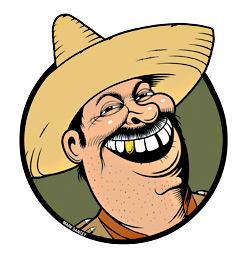Dear Mexican,
As a kid, I grew up with Mexicans who stole things just to steal. As an adult, I see much of the same behavior from adult Mexicans and their children. And I don’t mean just the poor Mexicans. Why is it in their nature for Mexicans to steal?
Larcenous Lester
Dear Gabacho,
The Chicano answer? Mexicans rob as payback for the United States swiping half of Mexico during the Mexican-American War. The sociological view? Poor people tend to commit more burglaries than the rich or middle class, and many Mexicans in los Estados Unidos are a missed paycheck away from the welfare cheese. Or I can sidestep your question and claim that, even if your assertion is true, gabacho embezzlement is ultimately the bigger crime and refer to the convictions of many top executives as proof. All of these explanations are intellectually dishonest responses—but that’s what your pregunta deserves. Theft is no more an innate trait amongst Mexicans than it is amongst other ethnic groups—gabachos only think it is due to centuries of stereotypes perpetuated by American-made caricatures ranging from the Frito Bandito to Carlos Mencia. I will admit to one thing that Mexicans are prone to steal, though: low-paying jobs from Americans. And that couldn’t happen without the help of the free market’s invisible hand and the lazy asses of gabachos.
I’m a pocha from SanTana now living in Portland, Ore., a town crawling with gabachos. Why? Because I married one. I love that silly gabacho pelón, and as a Mexican, I show him my affections the only way I know how—by teasing him. He doesn’t understand how humor at his expense is a sign of love, and I’ve tried explaining that there’s nothing that Mexicans cannot laugh at, love included. When a Mexican teases, it’s a sign of esteem. I’ve had a similar conversation with some Italian friends, and they get it, but the gabachos take themselves so seriously! I love my tía and primas no less for calling me gorda panzona growing up. How do I explain to my husband and gabacho friends in general that when I tease them and their mothers about how much they look like a Guatemalan when they act like tontos, I do it out of love and not to be a babosa?
Cabrona Chistosa
Dear Funny Badass Wabette,
Gracias for nothing. I just spent a couple hundred words arguing that thievery isn’t Mexico’s second national pastime after soccer—and then you try to take my job! Tell those Portland gabachos what you told me—that teasing is a sign of amor for Mexicans, that nothing is so holy that you can’t chop it down a couple of pegs with choice invectives like gorda panzona (big-bellied fatty) or pelón (baldy). If you really want to impress them, reference Mexican philosopher Jorge Portilla’s 1966 tome, Fenomenología del Relajo, y Otros Ensayos (Phenomenology of Relajo, and Other Essays), in which he examines the uniquely Mexican concept known as echando relajo (roughly translated as “bullshitting”) and its relationship to the Mexican propensity to make light of everything. The philosopher’s take: “The moral subject is transformed into a humorist when she begins to understand suffering as necessarily derived from finitude, as something essential to the human condition.” Translation: Faced with the terrifying reality of being Mexican, Mexicans must laugh or get drunk trying.
Muchos tamales go to Carlos Alberto Sanchez, professor of philosophy at San Jose State University, for his help on this question. Read the good profe‘s essay, “The Phenomenology of Jorge Portilla: Relajo, Gelassenheit, and Liberation,” in this spring’s issue of The American Philosophical Association Newsletter on Hispanic/Latino Issues. See, Larcenous Lester? Mexicans don’t steal—they cite.
Got a spicy question about Mexicans? Ask the Mexican at garellano@seattleweekly.com. Those of you who do submit questions: They will be edited for clarity, cabrones. And include a hilarious pseudonym, por favor, or we’ll make one up for you! También, a glossary deciphering some of the Mexican’s more popular catchphrases can be found at www.seattleweekly.com.








